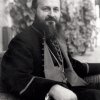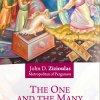PhD, University of Chicago, 1997
2612 Cathedral of Learning
412.624.5989, e-mail: This email address is being protected from spambots. You need JavaScript enabled to view it.
Fields
Religion and society in the Balkans and South Asia, topics in comparative religion
Teaching
Eastern Orthodoxy, Mysticism East and East, Saints East and West, Religions of India I, Religions of India II: Storytelling as a Religious Form, Christian-Muslim Relations
Selected Publications
- "Empires are Us: Identifying with Differences," in Images of Imperial Legacy: Modern Discourses on the Social and Cultural Impact of Ottoman and Habsburg Rule in Southeast Europe, edited by Tea Sindbaek and Maximilian Hartmuth, Berlin: LIT Verlag, 2011.
- “St. Sava and the Power(s) of Spiritual Authority,” Serbian Studies 24.1-2 (2010): 49-62.
- “Teoloska antropologija zene: pravoslavna perspektiva” (“Theological Anthropology of Woman: An Orthodox Perspective”) in I vjernice i gradjanke (Women as Believers and Citizens), edited by Zilka Spahic-Siljak and Rebeka Anic, Sarajevo: TPO Foundation, 2009
- "Two Methods of Contemplation: Yoga and Hesychast Prayer," Glasnik Etnografskog Instituta SANU (Herald of the Ethnographic Institute of the Serbian Academy of Sciences and Arts) LV/2 (2008)
- Varijacije na temu 'Balkan' [Variations on the Theme 'Balkans'], Belgrade: Filip Višnjić, 2006
- "Kosovo: Reality of a Myth and Myth of Many Realities," in Serbien und Montenegro, Vienna: Österreichische Osthefte, 2006
- "The Aesthetics of Theosis: Uncovering the Beauty of Image," in Aesthetics as a Religious Factor in Eastern and Western Christianity, edited by W. van den Bercken and J. Sutton, Leuven: Peeters Publishers, 2006
- "National Memory as Narrative Memory: The Case of Kosovo" in National Memory in Southeastern Europe, edited by Maria Todorova, London: Hurst & Co., 2004
- "What's so Byzantine about the Balkans?" in Balkan as Metaphor, edited by D. Bijelić and O. Savić, Massachusetts Institute of Technology Press, 2002
- "Nesting Orientalisms: The Case of Former Yugoslavia," Slavic Review 54 (1995)
- The World on the Turtle's Back: Myths, Legends and Stories of the Iroquois, 1991 [translator]
- The Painter of Signs by R.K. Narayan, 1986 [translator]
Honors and Awards
- Executive Board member, North American Society for Serbian Studies, 2010 to date
- Elected, President of the North American Association of Serbian Studies, 2008
- Elected, Vice President of the North American Association of Serbian Studies, 2006
- United States Institute of Peace Fellowship for the project "On Common Ground: Christianity and Islam in the Balkans," 2005-2006
- National Council for Eurasian and East European Research, Policy Research Fellowship, 2001-2002
Current Projects
- A member of international and multidisciplinary project on "Antagonistic Tolerance: Competitive Sharing of Religious Sites" [in Turkey, Bulgaria, Portugal, Peru and Mexico; 2009-2012]. Project Director: Robert M. Hayden, Anthropology, University of Pittsburgh.
- “Contemporary Culture and New Religiosity: Strategies of Individual and Collective Identities” (in Serbia), with Dr. Aleksandra Pavičević, Ethnographic Institute of Serbian Academy of Sciences and Arts, Belgrade. A three-year collaborative research project culminating in an edited volume.
- A collection of essays on Indological themes (book ms)
University Affiliations
Core faculty member of the Indo-Pacific Studies Program, Asian Studies Center and Center for Russian and East European Studies of the University Center for International Studies
Interview
Magazine Vreme (Serbian)





